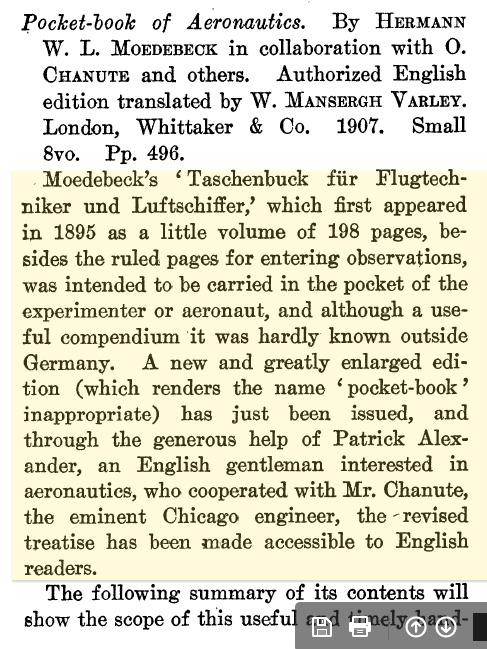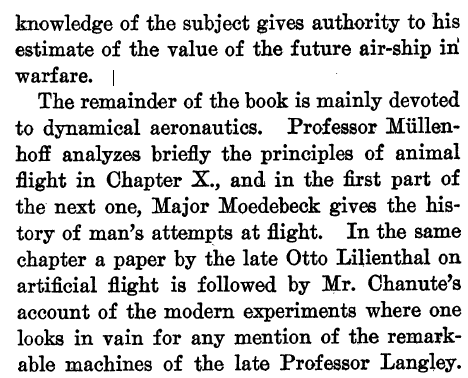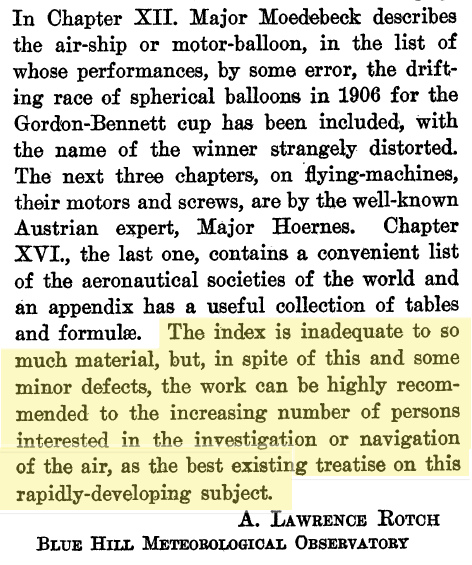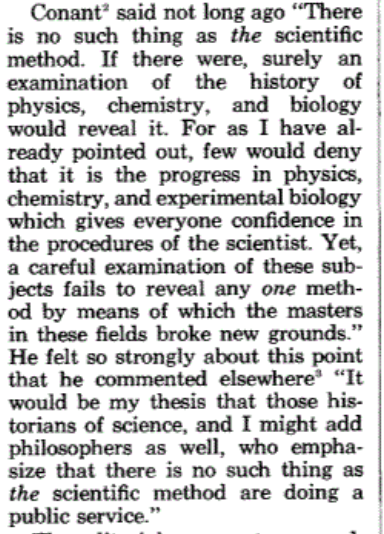It looks like you're using an Ad Blocker.
Please white-list or disable AboveTopSecret.com in your ad-blocking tool.
Thank you.
Some features of ATS will be disabled while you continue to use an ad-blocker.
8
share:
What's really interesting about this is how early it was in the age of manned flight, and it's talking about a 'treatise' which was actually a pocket
book, first sold in Germany, but translated to English for further distribution. The book started out in 1895, before flight had been achieved, and
sounds like a repository of the leading ideas & designs at the time, the basics of known principles & history of what had been achieved up until then.
It also included tables & formulas, plus a list of the societies at the time.



www.jstor.org...
To me it seems like a certain bit of humanity has been lost over the years. I suppose we have the same thing with mailing lists and groups, forums & speciality sites, but it's actually a little disconcerting when I look back at how critical I or others have been on people who are working on new technologies. There's a notion that if something has first been predicted, confirmed & approved by the establishment, it's pseudoscience.
Yet, back in the late 1800s, and early 1900s, you can find members of esteem, scientists critical on powered flight, as much as providing a 'debunking' themselves. Though it seems today that mentality is far more popular.
From the 60s, where establishment thinking and bureaucracy along with accepted and affirmed behaviours & system, had all moved long ahead of where it'd been half a century earlier, I found another article with a brilliant quote in it:

They go on to say that science is an art-form, not a simple method. For some, especially chemists (as they are basically not much different from culinary artists if they are practical) or engineers-mechanical or otherwise, or probably of various disciplines, this might resonate for them. It's a nice step out of the mundane, boring we might see the world of corporate work or study today.
There was a time of great invention, and thinking outside the box was far more valuable than inside.



www.jstor.org...
To me it seems like a certain bit of humanity has been lost over the years. I suppose we have the same thing with mailing lists and groups, forums & speciality sites, but it's actually a little disconcerting when I look back at how critical I or others have been on people who are working on new technologies. There's a notion that if something has first been predicted, confirmed & approved by the establishment, it's pseudoscience.
Yet, back in the late 1800s, and early 1900s, you can find members of esteem, scientists critical on powered flight, as much as providing a 'debunking' themselves. Though it seems today that mentality is far more popular.
From the 60s, where establishment thinking and bureaucracy along with accepted and affirmed behaviours & system, had all moved long ahead of where it'd been half a century earlier, I found another article with a brilliant quote in it:

They go on to say that science is an art-form, not a simple method. For some, especially chemists (as they are basically not much different from culinary artists if they are practical) or engineers-mechanical or otherwise, or probably of various disciplines, this might resonate for them. It's a nice step out of the mundane, boring we might see the world of corporate work or study today.
There was a time of great invention, and thinking outside the box was far more valuable than inside.
edit on 25-8-2016 by boncho because: (no
reason given)
a reply to: boncho
Wow, as a graphic design student I always wanted to tell people everything is art, now I am as a designer and night time teacher.
Funny how I always felt this way towards science but never came across this. Maybe it was my art philosophy classes.
Wow, as a graphic design student I always wanted to tell people everything is art, now I am as a designer and night time teacher.
Funny how I always felt this way towards science but never came across this. Maybe it was my art philosophy classes.
the council of despair, that there is no such thing as the scientific method, is incorrect. The Handbook shows clearly that there is a method. Does
it fly? Observers can verify, whether or not they have read and believed the handbook. Change the technology. Observe. is it flying better faster
farther? if no, mod the tech. The fundamental paradigm of science is hypothesis tech application observation then modification of the hypothesis.
the method, for example, does not go to the Torah, the Koran, the Talmud and see if it flys.
the method, for example, does not go to the Torah, the Koran, the Talmud and see if it flys.
a reply to: boncho
Speaking of thinking outside the box...
BigThink.com Nikola Tesla Predicted Drones in 1898.
His idea was radio controlled ships not the flying bombers we have now but same difference. Seems that there is a group that want to put the Lockheed nuclear fusion reactors in full automated ships...
Yanko Design - Autonomous Ships of the Future.
So yeah, lots of forward thinking going on during that time period! I think quantum mechanics was also being sorted out around then too.
S+F
Speaking of thinking outside the box...
BigThink.com Nikola Tesla Predicted Drones in 1898.
His idea was radio controlled ships not the flying bombers we have now but same difference. Seems that there is a group that want to put the Lockheed nuclear fusion reactors in full automated ships...
Yanko Design - Autonomous Ships of the Future.
So yeah, lots of forward thinking going on during that time period! I think quantum mechanics was also being sorted out around then too.
S+F
a reply to: darkstar57
The scientific method is great for confirming or denying, essentially, legwork. Objective analysis. Science is more than simply confirming something someone else created or devised. Just as many inventions or discoveries are accidents.
I think that's the point.
Observers can mark down everything in the book, use the charts & tables, read the histories, etc. The plane was not invented until 1900s, and they had been working at it for a good number of years. In fact, long enough for politicians to recommend all funding ceased because many deemed it impossible. That was the moral of the story.
No one mentioned religion by the way. Except you.
And even the pocket book on flight is a nostalgic memory of yesteryear, since getting into something today might cost you $10,000 in published papers, or multiple journal access memberships.
make sense?
the council of despair, that there is no such thing as the scientific method, is incorrect.
The scientific method is great for confirming or denying, essentially, legwork. Objective analysis. Science is more than simply confirming something someone else created or devised. Just as many inventions or discoveries are accidents.
I think that's the point.
Observers can mark down everything in the book, use the charts & tables, read the histories, etc. The plane was not invented until 1900s, and they had been working at it for a good number of years. In fact, long enough for politicians to recommend all funding ceased because many deemed it impossible. That was the moral of the story.
No one mentioned religion by the way. Except you.
And even the pocket book on flight is a nostalgic memory of yesteryear, since getting into something today might cost you $10,000 in published papers, or multiple journal access memberships.
make sense?
new topics
-
Dick Van Dyke saved from Wildfire by neighbours on his 99th birthday
People: 1 hours ago
top topics
-
Marvin Gabrion's sentence commuted by Biden
US Political Madness: 17 hours ago, 14 flags -
London Christmas Market BANS Word ‘Christmas’
Social Issues and Civil Unrest: 17 hours ago, 13 flags -
1 Billion dollars
General Entertainment: 15 hours ago, 6 flags -
Dick Van Dyke saved from Wildfire by neighbours on his 99th birthday
People: 1 hours ago, 1 flags
active topics
-
London Christmas Market BANS Word ‘Christmas’
Social Issues and Civil Unrest • 36 • : SprocketUK -
Trump says ownership of Greenland 'is an absolute necessity'
Other Current Events • 39 • : Dalamax -
Dick Van Dyke saved from Wildfire by neighbours on his 99th birthday
People • 0 • : gortex -
RIP Merrily Harpur British Big Cat Realist
Cryptozoology • 4 • : TimBurr -
Statements of Intent from Incoming Trump Administration Members - 2025 to 2029.
2024 Elections • 51 • : WeMustCare -
JILL BIDEN Wants JOE to Punish Democrats Who Forced Him to Leave Office in Disgrace on 1.20.2025.
2024 Elections • 15 • : Electriccowboy -
Christmas Dinner ??
Food and Cooking • 15 • : Mantiss2021 -
U.S. Govt Agencies That Protect Criminals in Government - National Archives Records Admin-NARA.
Political Conspiracies • 9 • : 777Vader -
NYPD arrests migrant who allegedly set woman on fire on subway train, watched her burn to death
Breaking Alternative News • 51 • : QET0110 -
Merry Christmas !!
General Chit Chat • 17 • : rickymouse
8
